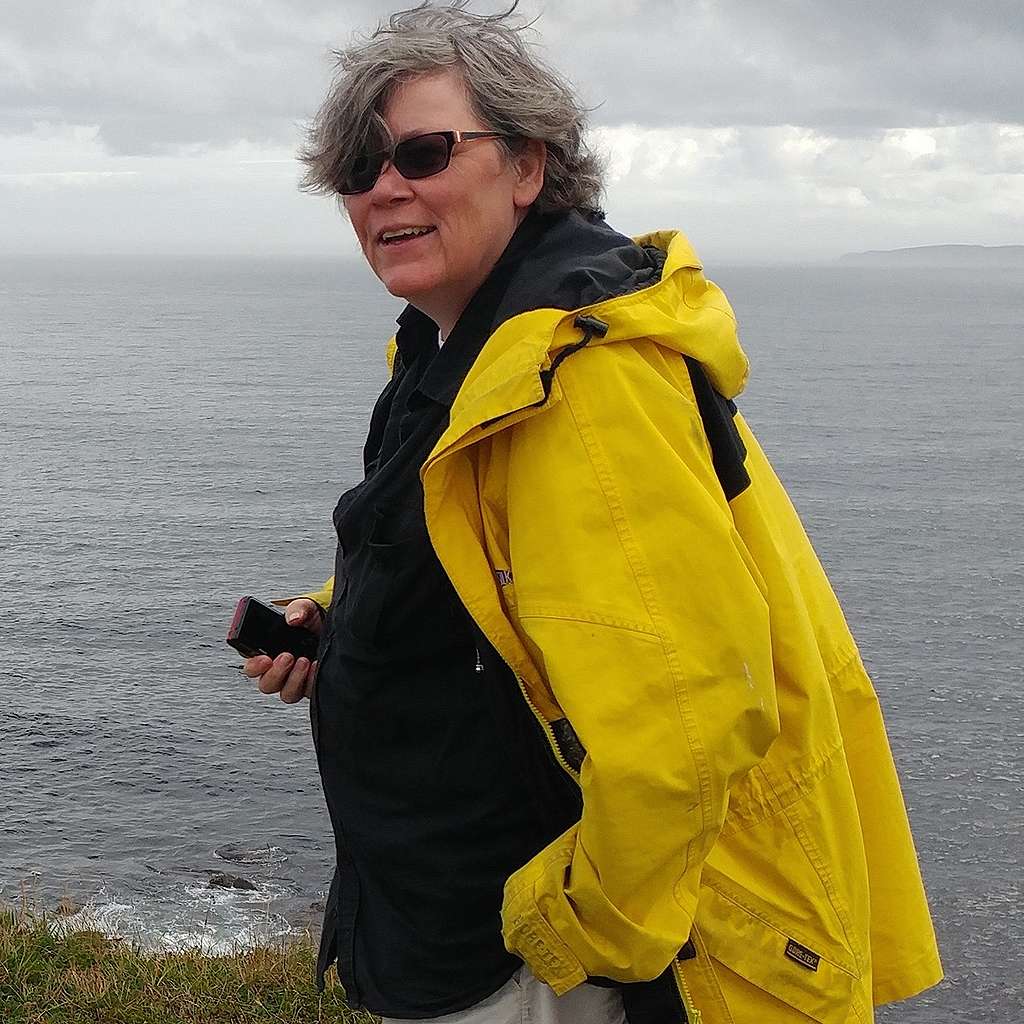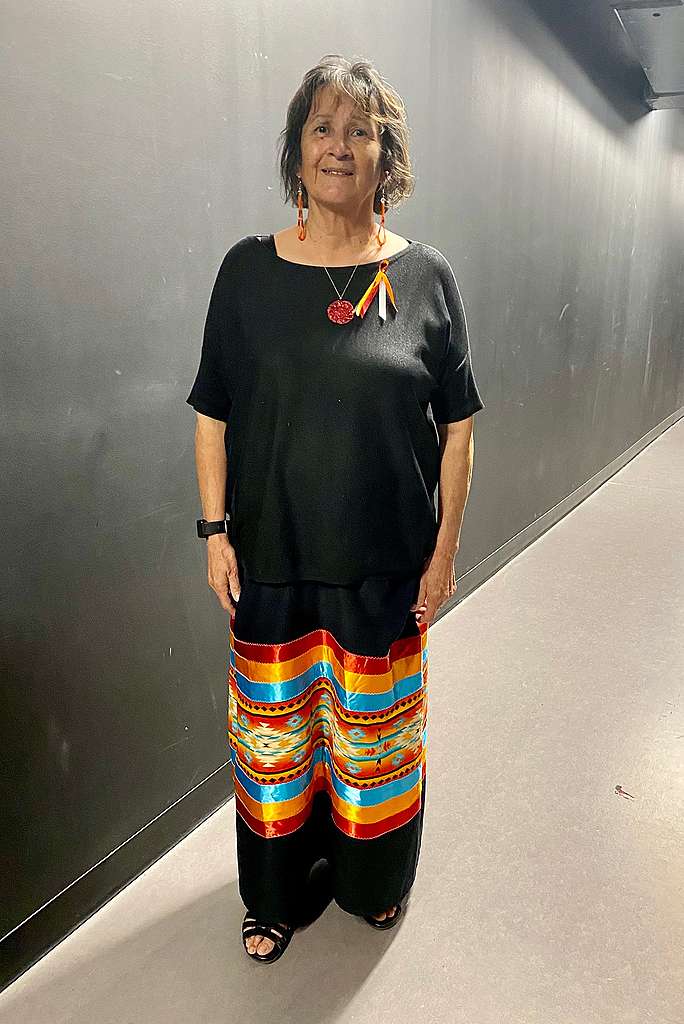As part of Greenpeace Canada’s Rethinking Nature Protection art call, we have the pleasure and honour of showcasing the work of 5 artists in their vision of what decolonization and Nature protection truly means. To kick us off, writer, director and editor Carmel Whittle shares her original film There is no word.
This film is about rethinking nature protection: why we should and how we can do this. The narrator describes the basis for this rethinking: we are nature and not separate from nature. Therefore taking care of nature is taking care of ourselves. She teaches us the Seven Grandfather Teachings from her traditional Ojibway, Algonquin Anishinaabe territory as a profound way of bringing this understanding into our lives – only truly thriving as the environment thrives. Doing the right thing requires that we care for, nurture, and heal every element of our environments: the air, waters, rock, plants, trees and all creatures. This way of thinking is rising in the world today, and from youth to elder the understanding is growing. Please listen to these teachings, and to nature.
Carmel Whittle, Director/writer/editor
About the artist

Carmel A. Whittle is a Mi’kmaw/Irish educator, art facilitator and curator, visual artist, songwriter, independent filmmaker, and Identifies as she, queer, 2Spirit and an activist for social justice. She is the director and curator of the No Borders Art Festival. She is the coordinator for the Indigenous Artists Coalition, and program coordinator for the Thunderbird Sisters Collective and member of the Digital Arts Resource Centre, Ottawa. She is co-host, developer for Podcast#83 a call to action, series of discussions with non-Indigenous and indigenous poets, musicians and artists.
She has facilitated and curated Indigenous youth art programming and coordinated group discussions on diversity in the arts with the Independent Media Arts Association, IMAA. She works as a community outreach and Indigenous Liaison, with the Nectar community art centre. In partnership with Gallery 101 and Research In Art Ottawa (RIA), she facilitated a series of workshops specific to the Truth and Reconciliation Commission’s recommendations for anti-appropriation and the decolonization of the arts.
She supports the decolonized recommendations to the city to make granting funds accessible to all community members. A lifelong learner in Indigenous/Canadian studies at Carleton University, she is a member of the University of Ottawa, Opirg Circle of Elders and Change makers and works from her studio in Ottawa.
You can find Carmel’s work at: www.carmelwhittle.com
About the narrator, Grandmother Louise Garrow
Louise Garrow is Anishnaabekwe from Sagamok First Nations. She works on Anishnaabemowin Language, translation and teaching. Currently she teaches Introductory Anishnaabemowin at Wabano Centre for Aboriginal Health. She is the No Borders Community Voices Grandmother and shares cultural teachings and knowledge related to the song cycle as part of each rehearsal. Previously Louise worked in the federal public service for a total of 27 years; including First Nations Inuit Health Branch on women and children health, mental health and wellness; Indigenous student employment, Indigenous cultural competency. She also worked at Trent University, Indigenous Studies for 9 years working as curriculum coordinator and Native Student Counsellor.

Stay tuned for the rest of our Rethinking Nature Protection art call winners, who will be revealed weekly over the course of the next five weeks!

Discussion
Nice job Carmel, Patsea, Grandmother and the natural world. I loved the big prints dancing in the wind in the last part most of all. Great job!
La terre aurait plus de 4,5 milliards d'années après qu'un big-bang eut lieu, il y aurait 13 à 14 milliards d'années. Big-bang ou non, nous saurions que nous serions tous poussières d'étoiles, aurait dit l'astrophysicien Hubert Reeves, parce que nos principaux constituants physiques et chimiques - minéraux, oxygène, carbone, etc. - auraient été issus d'eux grâce à la nucléogénèse. Affirmer désormais, et par conséquent, que nous serions tous issus de la Nature et que nous devrions y faire attention, parce qu'entre autres nous nourrissant, nous régénérant, nous éclairant, nous réchauffant, nous abritant, nous soignant, nous protégeant, nous sécurisant, nous émerveillant... ne pourrait-ce plus être vraiment un manque d'évidence? Certes, certains liens sembleraient encore nous manquer, à savoir nos origines, comme en quoi pourrait consister la cause de tous nos problèmes physiques, biologiques, psychologiques et sociologiques. Mais en revanche, ne saurions-nous pas que nos scientifiques ne feraient que ça, découvrir des structures (jamais la Structure), autrement dit des liens entre nous et ce qui nous aurait vu et fait venir au monde? Pour ne citer que quelques exemples, la radioactivité pourrait évidemment causer des cancers, mais nous saurions aussi qu'elle pourrait médicalement sauver des vies. Pour son origine, nous saurions que par de plus en plus de connaissances géologiques, par compteur Geiger, par radiodatation, etc., nous pourrions nous en approcher. Si maintenant, nous désirerions continuer avec ce qui serait moins évident ou plus du domaine des sciences dites de l'homme, est-ce que quelque problème psychologique ou sociologique ne pourrait pas venir de quelque déséquilibre entre l'homme et une certaine partie de son environnement concernant entre autres ses méconnaissances sur le climat (température, intempéries, cataclysmes, etc.)? Est-ce qu'ils ne pourraient pas générer entre autres autant de problèmes reliés à l'agriculture que de problèmes personnels et relationnels, etc. (sans réductionnisme scientifique)? Encore là, nous ne pourrions rien affirmer, mais nous saurions tous qu'il faudrait s'attaquer à la racine du mal pour l'enrayer définitivement, comme ne pas reproduire les erreurs du passé. Concernant enfin les Premières Nations, voilà bien ce qui pourrait confirmer en partie ce qui viendrait d'être considéré. Eux qui depuis toujours auraient fait corps avec la terre, la mer et le ciel, qui même pourraient y avoir vu métaphoriquement une multiplication de ces éléments dans chacun de ces constituants (l'ours esprit, etc.), est-ce que depuis longtemps, ils n'auraient pas démontré qu'ils pourraient être plus respectueux éthiquement, être plus en santé, souffrir moins de ses maladies dites de civilisation (stress, psychopathologie, isolement, intoxications, etc.), du moins bien avant l'arrivée de l'homme blanc qui cherchait plutôt à exploiter le monde, à le dominer, à en dilapider les ressources, etc., à une échelle que nous qualifierions d'industrielle? Merci aux membres des Premières Nations.
La terre aurait plus de 4,5 milliards d'années après qu'un big-bang eut lieu, il y aurait 13 à 14 milliards d'années. Big-bang ou non, nous saurions que nous serions tous poussières d'étoiles, aurait dit l'astrophysicien Hubert Reeves, parce que nos principaux constituants physiques et chimiques - minéraux, oxygène, carbone, etc. - auraient été issus d'elles grâce à la nucléogénèse. Affirmer désormais, et par conséquent, que nous serions tous issus de la Nature et que nous devrions y faire attention, parce qu'entre autres nous nourrissant, nous régénérant, nous éclairant, nous réchauffant, nous abritant, nous soignant, nous protégeant, nous sécurisant, nous émerveillant... ne pourrait-ce plus être vraiment un manque d'évidence? Certes, certains liens sembleraient encore nous manquer, à savoir nos origines, comme en quoi pourrait consister la cause de tous nos problèmes physiques, biologiques, psychologiques et sociologiques. Mais en revanche, ne saurions-nous pas que nos scientifiques ne feraient que ça, découvrir des structures (jamais la Structure), autrement dit des liens entre nous et ce qui nous aurait vu et fait venir au monde? Pour ne citer que quelques exemples, la radioactivité pourrait évidemment causer des cancers, mais nous saurions aussi qu'elle pourrait médicalement sauver des vies. Pour son origine, nous saurions que par de plus en plus de connaissances géologiques, par compteur Geiger, par radiodatation, LHC, etc., nous pourrions nous en approcher. Si maintenant, nous désirerions continuer avec ce qui serait moins évident ou plus du domaine des sciences dites de l'homme, est-ce que quelque problème psychologique ou sociologique ne pourrait pas venir de quelque déséquilibre entre l'homme et une certaine partie de son environnement concernant entre autres ses méconnaissances sur le climat (températures, intempéries, cataclysmes, etc.)? Est-ce qu'elles ne pourraient pas générer entre autres autant de problèmes reliés à l'agriculture que de problèmes personnels et relationnels, etc. (sans réductionnisme scientifique)? Encore là, nous ne pourrions rien affirmer, mais nous saurions tous qu'il faudrait s'attaquer à la racine du mal pour l'enrayer définitivement, comme ne pas reproduire les erreurs du passé. Concernant enfin les Premières Nations, voilà bien ce qui pourrait confirmer en partie ce qui viendrait d'être considéré. Eux qui depuis toujours auraient fait corps avec la terre, la mer et le ciel, qui même pourraient y avoir vu métaphoriquement une multiplication de ces éléments dans chacun de ces constituants (l'ours esprit, etc.), est-ce que depuis longtemps, ils n'auraient pas démontré qu'ils pourraient être plus respectueux éthiquement, être plus en santé, souffrir moins de ses maladies dites de civilisation (stress, psychopathologie, isolement, intoxications, etc.), du moins bien avant l'arrivée de l'homme blanc qui cherchait plutôt à exploiter le monde, à le dominer, à en dilapider les ressources, etc., à une échelle que nous qualifierions d'industrielle? Merci aux membres des Premières Nations. (attention aux fautes de toutes sortes, de conjugaison, de mots nouveaux, etc., qui pourraient apparaître à nouveau, à cause du site, je n'y serais pour rien)
Je tiens à m'excuser encore une fois de la mauvaise publication par le site de mon texte ici haut, n'y ayant même pas de paragraphes (mon nom étant Jocelyn et non Jocelyne). Je pourrais vous mentionner quelques fautes dans le texte : '' des '' poussières d'étoiles et non '' les '', nos principaux constituants '' physiques '' et chimiques... je n'ai pas mis le mot '' éclair '' après désormais, je n'ai pas mis le mot '' suggérons '', etc. (je m'arrête ici - texte devenu illisible à cause du site). Un effort de la part du site SVP pour faire quelques corrections...
Merci au site qui viendrait de tout corriger les fautes (on pourra enlever mes alertes pour avertissement de texte illisible), y compris pour mon nom Jocelyn au lieu de Jocelyne (pouvant avoir le même problème parfois ailleurs). Ce serait cependant le texte avec l'acronyme LHC qui serait le meilleur texte, désolé.
Je tiens à m'excuser encore une fois de la mauvaise publication par le site de mon texte ici haut, n'y ayant même pas de paragraphes (mon nom venant de changer pour Jocelyn et non Jocelyne, 2e essai). Je pourrais vous mentionner quelques fautes dans le texte : '' des '' poussières d'étoiles et non '' les '', nos principaux constituants '' physiques '' et chimiques... je n'ai pas mis le mot '' éclair '' après désormais, je n'ai pas mis le mot '' suggérons '', etc. (je m'arrête ici - texte devenu illisible à cause du site). Un effort de la part du site SVP pour faire quelques corrections...